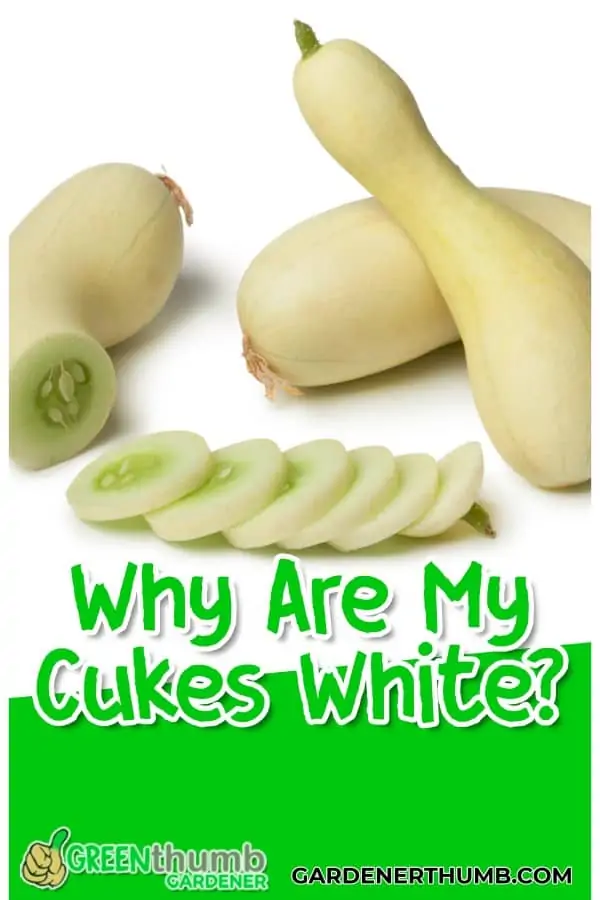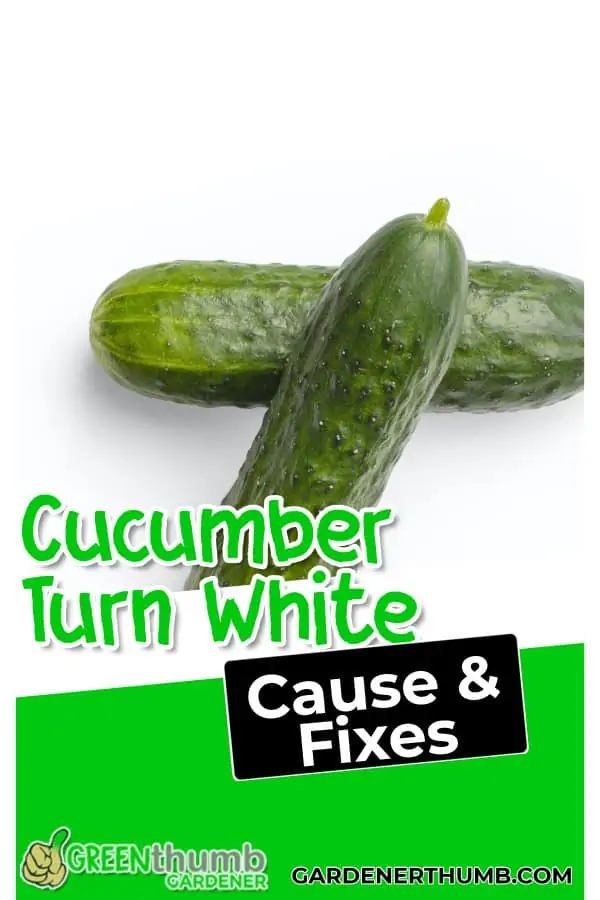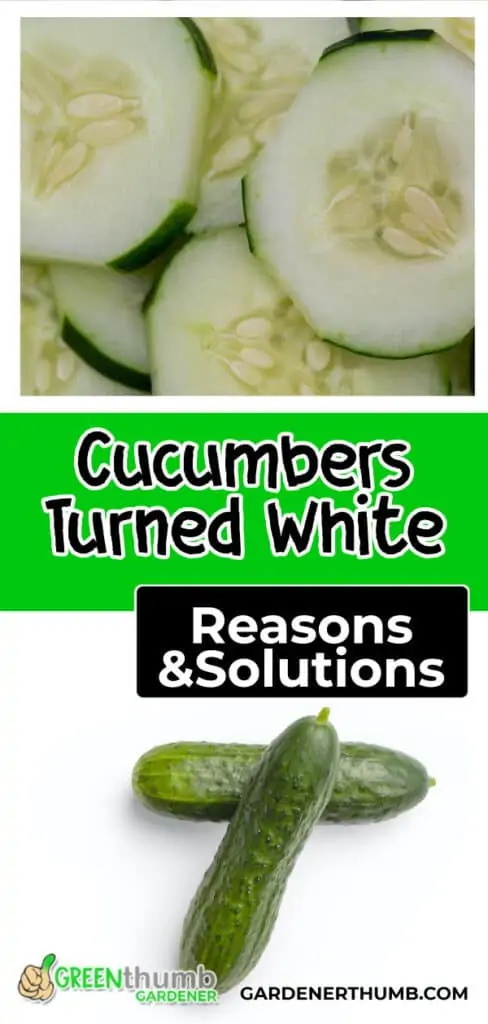Why Are My Cucumbers White & Ways To Fix Them
Last updated: 5/10/22
We love to grow cucumbers here at the Green Thumb Gardener house. My daughter is always looking to pick the best cucumbers once they are ripe.
Once when my daughter went to harvest a few cucumber fruits she planted, she came upon a white cucumber and asked me why are my cucumbers white and are they safe to eat.
As an experienced gardener & lover of cukes, I knew there were a few possibilities that it could be which I’ll share with you.
Green thumb Gardener occasionally links to product and/or services offered by vendors to assist you with all your gardening needs. Some of these may be affiliate links, meaning we earn a small commission if items are purchased.
Want to Download a Garden Hack Guide for FREE

Enter your email below and we will send you a guide to help you SAVE money in your garden.
Listen to this post on the Green thumb Gardener Podcast
Subscribe to the Green Thumb Gardener Podcast on iTunes, Spotify, Or Google Podcast HERE
Possible Reasons Why Cucumbers Turn White
Cucumber fruit turns white for various causes, including common cucumber diseases like powdery mildew and Pythium fruit rot. Other common cucumber plant problems such as excessive moisture and blanching can also cause cucumbers to turn white.
Cucumber seeds develop quickly as long as they receive plenty of moisture and warmth. Cucumbers grow fairly quickly and ripen within six weeks in warm soil.
However, there are times that you planted green cucumbers and ended up with white cucumbers instead of their usual pale green color.
Before we go any further, it’s worth noting that many varieties of cucumber on the market today have been developed to yield white fruit. Cucumis sativus or white wonder is one example of a white cucumber variety.
These white cucumber varieties are remarkably similar to green types In texture and flavor. However, if the cucumber type you planted is the green variety but becomes white, you have a problem.

Excessive Moisture | Overwatered Cucumbers
Cucumbers require consistent watering and need at least 1 inch of water per week. However, if you overwater, you may have some affected plants.
Excessive moisture erodes soil nutrients, resulting in white cucumbers. In addition, due to overwatering, cucumber plants are unable to obtain appropriate nutrients from the soil. For example, excessive watering leaches phosphorus.
Cucumbers turn pale or white when they have nutrient deficiency. They lack nutrients such as phosphorous, which are required for normal development.
Blanching | Cukes Need To Tan Too
Cucumbers require a lot of direct sunlight for their proper development. It needs enough sunlight hours for both the cucumber leaves and fruit.
Because of the enlarged leaves of cucumber plants, the entire fruit is often shaded. The lush foliage from other plants also causes blanching, resulting in a pale white color.
If your cucumbers have blanched due to a lack of light, all you need to do is allow some sunlight in.
Powdery Mildew
Powdery mildew is more common in gardens with poor air circulation and excessive humidity. This problem starts on the fruit’s upper surface, and the cucumbers may appear to be dusted with flour and have white spots.
It will then spread progressively across the entire fruit and make the cucumbers turn white.
Having adequate air circulation and installing a drip irrigation system will helps keep the leaves from excessive moisture which spread powdery mildew.
A baking soda solution is also a good way to eradicate powdery mildew.
Pythium Fruit Rot
This fungal disease, also known as a cottony leak, causes a significant growth of white fungal masses in cucumbers. It will first appear in the portions of the cucumber that is in direct contact with soil.
This fungal disease produces fruits with a soft, white fungal mass that resembles a bunch of cottons.
These spots swiftly spread to cover a considerable section of the fruit.
From a distance, your fruits appear to have gone white due to fungal infection.

Is it OK to Eat White Cucumber?
Cucumbers, as previously stated, are sweet, crisp, and nutritious fruits. However, if you eat cucumbers that are white, you may find they taste bitter.
The best alternative is to avoid eating infected white cucumbers, particularly those with white spots caused by powdery mildew or cottony leak. They may even be hazardous, and they do not taste good.
Those that have turned white due to blanching or excessive rain are safe to consume. However, vitamin deficiencies may cause a substantial loss of flavor.
So don’t take the chance; instead, discard any affected cucumbers and only look for healthy, ripe cucumbers.
How To Prevent Cucumbers From Turning White
There are several techniques to keep your cucumbers from becoming white and keep their green color.
Nutrient Leaching From Watering
Rectify the situation by supplying the plants with a phosphorous fertilizer to make up for the loss of nutrient. Phosphorous helps the plant maintain a nice color.
Follow a strict watering schedule and use only the right amount of water. If rainfall is low, it may be needed to water once a week and possibly twice a week in sandy soil type.
Cucumber plants need at least 1 inch of water a week.

Further Reading
Blanched Cucumbers
Blanching can be remedied in several ways. The simplest option is to cut the leaves back somewhat to allow for more sunlight and air circulation.
However, if they are trimmed too much, they may become sun-scalded. Instead, you can trim down some of the weaker plants or remove a few huge leaves to allow more light in.
You must place the plants in areas where they will receive adequate sunshine. To do this, train your cucumbers to grow up in poles or trellis.
Try to make sure they are not too close together so they can get adequate direct sunshine. That is not to say that your plants do not require shade; they do.
Cucumber Plant Diseases
Powdery mildew and pythium fruit rot can be controlled with a fungicide. However, utilizing chemicals has its own set of health risks.
Other alternatives, such as allowing appropriate plant spacing for good air circulation, are available. Another approach is to plant cucumbers in well-drained soil or to use drip irrigation to reduce humidity.
Final Thoughts
Cucumber cultivation can be enjoyable and straightforward. It also offers numerous health advantages and contains antioxidants, like flavonoids and tannins, which may lower the risk of chronic disease.
However, we must be vigilant and mindful of problems that threaten cucumber plants, such as cucumbers becoming white.
With care and attention, you will undoubtedly have a good yield. Have a bountiful harvest and happy picking.
Related Questions
Why are my cucumbers yellow-white?
Cucumbers turn yellow when they grow overripe. Then, the green color fades, resulting in yellowing pigment. But, they can also be caused by fluctuating temperatures, overwatering, and the use of wrong fertilizers.








